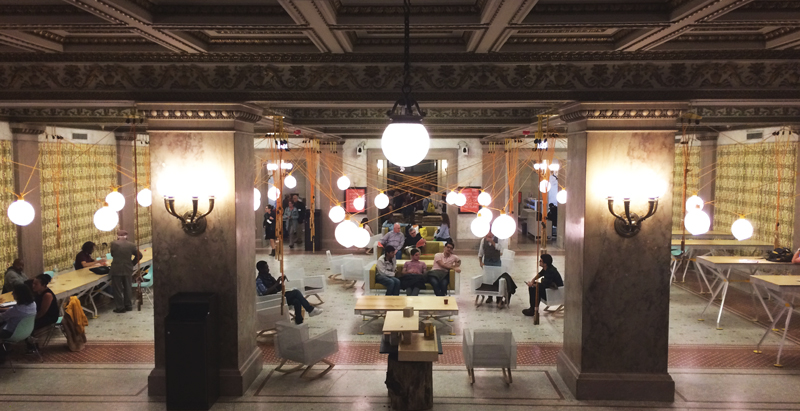It’s been nearly three weeks since the Chicago Architecture Biennial kicked off on Oct. 3. Reviews have been generally positive, from the Chicago Tribune’s Blair Kamin calling it a “mixed bag” with a vaguely titled, though well executed, theme, to The Wall Street Journal’s Julie V. Lovine, writing that the inaugural event has “just the right proportion of earnest effort to razzle-dazzle.”
But as Lovine puts it, the event’s title, “The State of the Art of Architecture” is indeed fitting, as it “is a pulse-taking of contemporary architecture as it could be—creative responses that suggest solutions to some of the intractable, quotidian challenges of our times.”
One thing that stood out for BD+C was the experimentation with new building materials and methods, drafted by both established and up-and-coming talents in the architecture world as a response to today’s environment, societal behavior, and business demands. Here are some highlights:
1.Dried Leaves in “The S House” by Vo Trong Nghia Architects
The Vietnamese firm is well known for incorporating nature into its projects, weaving green space in and out of the built area such as seen in their multifamily residential project, and designs for FPT University’s administrative and classroom buildings.
To the Chicago Architecture Biennial, Vo Trong Nghia brings another sustainable concept, The S House, which aims to make easy to build affordable homes that can be sheathed in locally sourced, renewable material.
According to Dezeen, the design was first released in 2012 and has been refined ever since. Each home should cost around $1,000 and can provide relief in countries struck by natural disasters.
The frame is a galvanized steel structure where each components is 130 pounds or less, and can be erected in under three hours. The frame is then sheathed in dried leaves, as displayed at the Biennial, but any other material that is locally available can substitute. The house is one of four full-sized houses on display at the event’s main exhibition in the Chicago Cultural Center building.
2. Cross-Laminated Timber in “Chicago Horizon” by Ultramoderne
The Rhode Island-based architecture firm Ultramoderne was the winner of the biennial’s Chicago Pavilion competition.
Dezeen reports that the Chicago Horizon pavilion was built “using the largest lengths of timber that can be shipped across North America.”
The structure is constructed near the Museum Campus by Lake Michigan, offering views of the Chicago skyline from the south east. The entire structure was built using cross-laminated timber.
The design uses cues from legendary German architect who later made Chicago home, Ludwig Mies van der Rohe.
3. Wooden Pallets in Low-Cost House by Tatiana Bilbao
Using wooden pallets to create a rustic, industrial look in interior design has been gracing the pages of design websites for a while, but Mexican architect Tatiana Bilbao is giving the shipping tool a greater purpose.
The architect’s low-cost home design relies on the lightweight yet sufficiently sturdy pallets to establish rooms. They can be shifted around as the household grows or shifts needs.
4. Rocks and Strings in “Rock Print” by Gramazio Kohler and Skylar Tibbits
Towering over attendees in the Chicago Cultural Center is the Instagram-ready, three-legged structure designed by Gramazio Kohler Research of ETH Zürich and Skylar Tibbits of MIT’s Self-Assembly Lab.
According to Archdaily, the structure was created by robotic hands that laid down strings, and between the layers of strings, rocks were placed by hand. A video is the best way to explain this:
The tower of rocks isn’t just an artistic sculpture. As The Wall Street Journal’s architecture writer Julie V. Iovine puts it, “the process has untold potential for sustainable and economic construction using the cheapest materials imaginable.”
Related Stories
Office Buildings | Oct 16, 2023
The impact of office-to-residential conversion on downtown areas
Gensler's Duanne Render looks at the incentives that could bring more office-to-residential conversions to life.
Giants 400 | Oct 11, 2023
Top 100 Industrial Sector Architecture Firms for 2023
Ware Malcomb, Arcadis, Stantec, and Gresham Smith top the ranking of the nation's largest industrial facility sector architecture and architecture/engineering (AE) firms for 2023, as reported in Building Design+Construction's 2023 Giants 400 Report.
Products and Materials | Oct 10, 2023
‘Works with WELL’ product licensing program launched by International WELL Building Institute
The International WELL Building Institute (IWBI) recently launched the Works with WELL product licensing program. Works with Well certification allows manufacturers to demonstrate that their products align with WELL strategies.
Mass Timber | Oct 10, 2023
New York City launches Mass Timber Studio to spur more wood construction
New York City Economic Development Corporation (NYCEDC) recently launched New York City Mass Timber Studio, “a technical assistance program to support active mass timber development projects in the early phases of project planning and design.”
Government Buildings | Oct 10, 2023
GSA names Elliot Doomes Public Buildings Service Commissioner
The U.S. General Services Administration (GSA) announced that the agency’s Public Buildings Service Commissioner Nina Albert will depart on Oct. 13 and that Elliot Doomes will succeed her.
Esports Arenas | Oct 10, 2023
Modular esports arena attracts more than gamers
As the esports market continues to grow to unprecedented numbers, more facilities are being developed by universities and real estate firms each year.
Higher Education | Oct 10, 2023
Tracking the carbon footprint of higher education campuses in the era of online learning
With more effective use of their facilities, streamlining of administration, and thoughtful adoption of high-quality online learning, colleges and universities can raise enrollment by at least 30%, reducing their carbon footprint per student by 11% and lowering their cost per student by 15% with the same level of instruction and better student support.
MFPRO+ News | Oct 6, 2023
Announcing MultifamilyPro+
BD+C has served the multifamily design and construction sector for more than 60 years, and now we're introducing a central hub within BDCnetwork.com for all things multifamily.
Giants 400 | Oct 5, 2023
Top 175 Healthcare Architecture Firms for 2023
HDR, HKS, CannonDesign, Stantec, and SmithGroup top BD+C's ranking of the nation's largest healthcare sector architecture and architecture/engineering (AE) firms for 2023, as reported in Building Design+Construction's 2023 Giants 400 Report. Note: This ranking includes revenue related to all healthcare buildings work, including hospitals, medical office buildings, and outpatient facilities.
Biophilic Design | Oct 4, 2023
Transforming the entry experience with biophilic design
Vessel Architecture & Design's Cassandra Wallace, AIA, NCARB, explores how incorporating biophilic design elements and dynamic lighting can transform a seemingly cavernous entry space into a warm and inviting focal point.

















